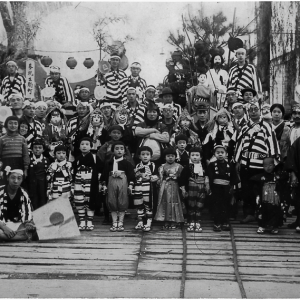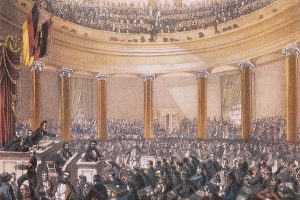The Japanese live under the era, which means the reign of the monarch only in the world. In February, there will be two holidays in which Japan is engraved on the calendar with a view of imperial history that makes Japan an unparalleled country for 126 generations. For most people living in this Japanese archipelago and the surrounding islands, this would be a normal holiday, wondering "what should I enjoy a day?" However, on the Internet and YouTube, there are a lot of imperial praise campaigns such as the Greater East Asia War innocence, mainly advertising. If this continues for 5 to 10 years, it will exert a tremendous propaganda effect and the campaign will permeate people's minds. It is by no means aggressive, but unknowingly imprints aversion and aversion to left-wing liberals, China, and North and South Korea. February, which leads the Japanese to the right, is extremely stuffy. I feel depressed. Under these circumstances, about 40 years ago, the experience of being shocked by the difference between Japan and Germany over independence, freedom, and the establishment of democracy revived in Germany.
■ The cause is the swearing of "leading Japan"

[Photo] 1940. Japanese people celebrating Kigen-setsu (National Foundation Day)
January 1989. With the death of Emperor Showa, there was a change. In the editorial weekly report, the editorial director of Kyodo News at that time said, "If it is the only era system in the world, I want to continue doing it." "Flirtatious". "terrible". A quarter of a century later, Shinichi Kitaoka, a professor emeritus at the University of Tokyo and the chairman of JICA, who served as the chairman of the Advisory Panel for Security Experts under the Shinzo Abe administration and accepted the exercise of collective self-defense rights with a conclusion, said, "Be sure to keep my eyes black. I will change the constitution. "
Takashi Ito, Professor Emeritus of the University of Tokyo (modern history of Japan), confided this ridiculous secret story in a magazine. Ito makes frivolous remarks that cannot be thought of as scholars, such as "loving the country is universal." Ito, who has a feeling of being made up as a post-war version of Hiraizumi Kiyoshi, led the "Meeting for Creating New History Textbooks".
The prestigious title stopped many people from thinking, made them agree with their opinions, and invited them to praise Japan. Kitaoka was a junior at the university and undergraduate school of the editorial director, and also participated in the Ito seminar of the Faculty of Letters and became a subordinate. All of them have become "authoritative parts" of Japanese propaganda equipment. Like Hiraizumi before the war, what they all have in common is that they are "leading Japan." It's a dangerous pride.
■ Prewar constitution that stagnates at the bottom of Japanese society
Seiichi Chadani, a professor at Shigakukan University, talked about corona and self-restraint.
"Some military personnel were only tried in the International Military Tribunal for the Far East, and they did not face the reason why the people united and supported the war." "The spread of the new coronavirus has been spreading since the war. It seems that the old constitution rooted in Japan is highlighted. It may be necessary to draw the current government's response and the reaction of the people to modern Japan, re-examine it, and expose the problems. "
I fully agree. However, apart from "exposing problems", changing "the way and attitude of the people's reaction" is a difficult task, a difficult task. For the time being, the Fumio Kishida administration of the Liberal Democratic Party Kochikai survived while hiding the abolition of Abe's right-wing and follow-up routes to the United States, reconciling with China and South Korea, and restoring confidence in ASEAN countries and Russia's Japan. To rebuild the maintenance liberal route. It may be laughed at as an illusion, but the decline of Japan's opposition forces today is so overwhelming that it gives us a glimpse of hope.
This is symbolized by the current compromise between the Japanese Communist Party's emperor system and Japan-US security. In the latter half of the 1960s, the socialist party disappeared and the joint struggle between the opposition parties, which had a certain fruitful security abandonment as a node, became a phantom. Certainly, with the rightward inclination of public opinion, the debate over the pros and cons of the emperor system becomes the target of anti-communist attacks in the style of the self-government restoration, leading to a drastic decrease in votes. Even so, if you declare that "the emperor system will not be abolished" and talk about the abolition of security and the elimination of the Self-Defense Forces, there will be neither a former nor a child. When it comes to the emperor system, at least the party platform says, "The current system in which one individual or one family is a symbol of'national unity'is incompatible with the principles of democracy and human equality." Why don't you complain about it all over? I can't do that either. It has been atrophied.
■ Judge of defeated country Germany
By the way, it can be said that the "old constitution rooted in Japan from the time of the war" that Chatani calls is a deep-seated disease of the Japanese.
A word about this old constitution.
During his time as a corporate journalist, it was impossible for him to speak directly with a Japanese judge. Japanese judges have abandoned their constitutionally guaranteed independence. He travels by shuttle car between the official residence and the courthouse, and a secretary's office is set up in front of the judge's office to refuse reporters from entering and exiting. Shooting in court is strictly prohibited. However, it currently only allows certain media outlets to record a few minutes before the court opens. However, general listeners cannot take notes. The Supreme Court's instructions are received directly and indirectly at the Judges' Meeting, which is held once a year. Far from being independent, each judge is as close as possible to a puppet controlled by the Supreme Court.
I had an unforgettable experience in Germany, where he stayed in the early 1980s. I covered the trial of a murder case in which a Turkish worker who had been mass-migrated to Germany at that time and was discriminated against was suspected. I want to take a picture of the court, but the court says "No photography". When I asked the secretary, he said that he had the permission of the judge. Then, I knocked on the judge's office. The chief judge seemed to be a little disappointed by the sudden appearance of the Orientals, but he allowed me to take pictures on the condition that "if the defendant and the prosecutor agree". It was a self-reliant and prompt decision without the judgment of his boss. At the court the next day, the presiding judge said, "A Japanese reporter wants to take a picture at the beginning. I ask for the opinions of the accused and the prosecutor."

[Photo] Federal Constitutional Court (Bundesverfassungsgericht) in Karlsruhe, Baden-Württemberg, Germany. The building is simple but heavy. Germany has always had the best judiciary in a city separate from the parliament and the seat of government. Near the border with Switzerland in southwestern Germany, the city with a population of about 300,000 is more than 500 kilometers away from the capital Berlin. It just implies the independence of the judiciary and keeps "administrative, legislative power and symbolic distance".
■ In the midst of the revolution, German citizens draft a constitution
 March 1848 A civil revolution took place in various parts of Germany. In Prussia, on March 18, in Berlin, citizens and workers were uprising, the liberal Kamphausen cabinet was established, a national parliament was established, and a new constitution was announced. In May, the Frankfurt Parliament = the picture on the left = was established and the unification of Germany was discussed. However, a counter-revolution broke out in Vienna in October and Berlin in November, and the Frankfurt Parliament disappeared in June, frustrating the revolution.
March 1848 A civil revolution took place in various parts of Germany. In Prussia, on March 18, in Berlin, citizens and workers were uprising, the liberal Kamphausen cabinet was established, a national parliament was established, and a new constitution was announced. In May, the Frankfurt Parliament = the picture on the left = was established and the unification of Germany was discussed. However, a counter-revolution broke out in Vienna in October and Berlin in November, and the Frankfurt Parliament disappeared in June, frustrating the revolution. A clear difference between him and myself that was noticed about 40 years ago. It was shocking. Compared to Britain and France, Germany's backwardness is often talked about based on the failure of the March 1848 revolution and the subsequent establishment of the Second Empire led by Prussia. However, even though the bourgeoisie failed to complete the revolution and allowed the rise of conservatives, it created and submitted its own constitution in the process of the revolution. Freedom and citizenship were firmly rooted in Germany in the mid-19th century. The commonly used expression that "the Constitution of the Empire of Japan was modeled after the Constitution of the German Empire" also has the act and distortion of the Meiji tyrannical nation.
The Constitution of the German Empire stipulated citizenship, and the power of parliament was also greatly recognized. It was the result of a revolutionary movement.
Even today, Japan's miserable backwardness is indescribable. Anyway, ahead of "National Foundation Day" and "Emperor's Birthday" to revive the prewar imperial myth, constant efforts and determination to keep the spirit of independence, freedom and resistance in the daily life of each individual are required.
